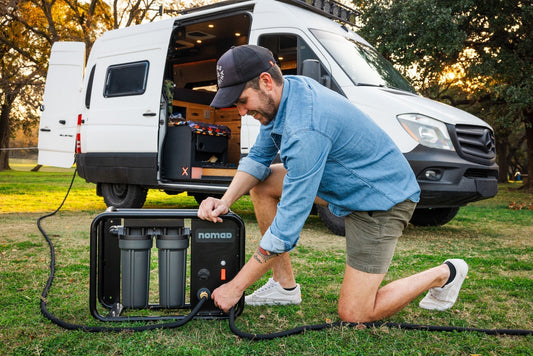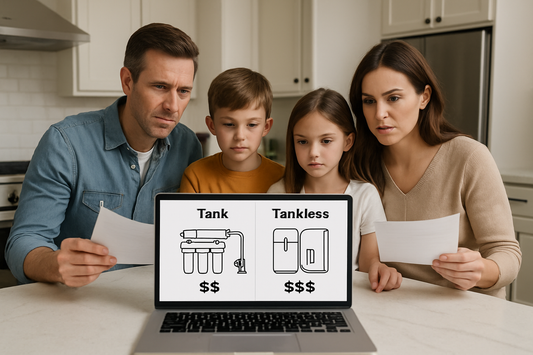you're deep in the backcountry, miles from the nearest town, when you realize your RV water filter cartridge has reached the end of its life. For outdoor enthusiasts who live by "Leave No Trace" principles, simply tossing it in the campfire isn't an option. Whether you're a weekend warrior or full-time nomad, responsible disposal of water filter cartridges is crucial for protecting the wilderness we love to explore.
Every year, millions of filter cartridges end up in landfills when they could be recycled or repurposed. For RV travelers and camping enthusiasts, this challenge becomes even more complex – but also more important. When your home is on wheels and nature is your backyard, sustainable practices aren't just good ethics; they're essential for preserving the places that call to your adventurous spirit.
Understanding RV and Camping Water Filter Systems
What Makes Outdoor Water Filters Different?
RV water filter replacement cartridges face unique challenges that home systems never encounter. Temperature extremes, constant vibration from road travel, and varying water quality from campground to campground put extra stress on filtration components. Understanding these differences helps outdoor enthusiasts make smarter recycling decisions.
Most RV and camping filters fall into these categories:
Activated Carbon Cartridges: Remove chlorine taste and odors from campground water supplies
Sediment Filters: Capture particles stirred up in older campground plumbing systems
Inline RV Filters: Portable units designed for space-conscious travelers Ceramic
Elements: Reusable cores that can be cleaned and maintained on the road
The Hidden Environmental Cost of Filter Waste
When RV water filter replacement becomes routine, the environmental impact adds up quickly. A typical full-time RV family generates 6-12 used filter cartridges annually. Multiply that by the 11 million RV households in America, and you're looking at potentially 132 million cartridges hitting landfills each year.
The materials in these cartridges – plastic housings, activated carbon, synthetic media – can persist in the environment for decades. For outdoor enthusiasts who've witnessed pristine landscapes transformed by human impact, this waste represents a direct threat to the places we cherish most.

How to Recycle Water Filter Cartridges: The Outdoor Enthusiast's Guide
Step 1: Plan Ahead with Manufacturer Programs
Before hitting the road, research recycling options for your specific filter brand. Many manufacturers offer take-back programs specifically designed for travelers. For example, if you're using ClearSource RV replacement filters, contact the manufacturer to understand their recycling protocols and mail-back options.
Pro Tip for RV Life: Create a small storage container in your RV specifically for used cartridges. This prevents them from getting forgotten in random compartments and ensures you're ready when you reach a recycling facility.
Step 2: Leverage Your Travel Route
Smart route planning can incorporate recycling stops. Many outdoor enthusiasts already plan trips around REI stores, Camping World locations, or outdoor gear retailers. These businesses often participate in take-back programs or can direct you to local recycling facilities.
Research stops in advance:
- Call ahead to confirm acceptance policies
- Ask about any preparation requirements (rinsing, disassembly)
- Inquire about bulk drop-off if you're traveling with a group
Step 3: Utilize Mail-Back Services from the Road
Mail-back programs become invaluable when you're spending extended time in remote areas. Many recycling services provide prepaid shipping labels, making it easy to send cartridges from any post office along your route.
Best practices for mail-back recycling:
- Package cartridges securely to prevent damage during shipping
- Include any required documentation or forms
- Keep tracking information until confirmed receipt
- Consider timing shipments from longer stays (week+ in one location)
Step 4: Connect with the RV Community
The RV and camping community excels at sharing practical solutions. Facebook groups, forums like iRV2, and campground bulletin boards often feature local recycling tips from fellow travelers. Someone has likely solved the exact recycling challenge you're facing in your current location.

Creative Repurposing for Off-Grid Adventures
Transform Old Cartridges into Camping Gear
Before recycling, consider whether used filter housings can serve new purposes in your outdoor adventures:
Storage Solutions: Clean plastic housings make excellent waterproof containers for small camping supplies, first aid items, or electronic accessories
Organization Systems: Mount empty housings in your RV or camp trailer as holders for tools, flashlights, or outdoor cooking utensils
Emergency Prep: Keep a few clean, empty cartridges as backup water storage containers for emergency situations
Supporting Sustainable Outdoor Practices
When you choose products from our outdoor water filter collection, you're supporting companies that prioritize sustainability. Look for filters with:
- Recyclable components
- Longer replacement intervals
- Reusable elements that can be cleaned rather than discarded
- Minimal packaging waste

Special Considerations for Remote Travel
Storage Challenges in Small Spaces
RV living demands creative solutions for storing used cartridges until recycling opportunities arise. Designate a specific area in your outdoor storage compartment, and consider vacuum-sealing cartridges to reduce space requirements.
Water Quality Variations
Different regions present varying water challenges, affecting how quickly filters reach replacement time. Desert areas with high mineral content may require more frequent changes, while mountain regions with naturally clean water sources might extend filter life. Adjust your recycling planning accordingly.
Leave No Trace Principles
True outdoor enthusiasts understand that responsible filter recycling aligns perfectly with Leave No Trace ethics. Every cartridge properly recycled is one less piece of waste potentially impacting wilderness areas. This responsibility extends beyond legal requirements – it's about preserving outdoor experiences for future generations.
Frequently Asked Questions
Can I recycle RV water filter cartridges at regular recycling centers?
Most municipal recycling centers don't accept filter cartridges due to mixed materials and potential contamination. Manufacturer take-back programs and specialized recycling services offer better options for RV travelers.
How should I store used cartridges during extended camping trips?
Rinse cartridges thoroughly, allow them to dry completely, then store in a designated container in your RV's exterior storage. This prevents odors and contamination while keeping them organized for proper disposal.
Are there recycling options specifically for full-time RV travelers?
Yes! Many mail-back programs cater to travelers, offering flexible shipping options and extended storage capabilities. Some RV parks also coordinate group recycling efforts for residents.
What's the environmental impact if I can't find recycling options in remote areas?
While recycling is ideal, proper disposal in regular waste systems is still better than littering or burning. Plan ahead by researching recycling stops along your route or using mail-back services from populated areas.





